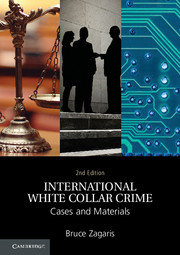Book contents
- Frontmatter
- Contents
- Preface
- 1 Introduction
- 2 Taxation
- 3 Money Laundering and Counterterrrorism Financial Enforcement
- 4 Transnational Corruption
- 5 Transnational Organized Crime
- 6 Export Control and Economic Sanctions
- 7 International Environmental Crimes
- 8 International Securities Enforcement
- 9 Extraterritorial Jurisdiction
- 10 International Evidence Gathering
- 11 Extradition and Alternatives
- 12 International Prisoner Transfer
- 13 The United Nations
- 14 The World Bank Group
- 15 INTERPOL
- 16 Economic Integration and Business Crimes
- Index
- References
13 - The United Nations
Published online by Cambridge University Press: 05 November 2015
- Frontmatter
- Contents
- Preface
- 1 Introduction
- 2 Taxation
- 3 Money Laundering and Counterterrrorism Financial Enforcement
- 4 Transnational Corruption
- 5 Transnational Organized Crime
- 6 Export Control and Economic Sanctions
- 7 International Environmental Crimes
- 8 International Securities Enforcement
- 9 Extraterritorial Jurisdiction
- 10 International Evidence Gathering
- 11 Extradition and Alternatives
- 12 International Prisoner Transfer
- 13 The United Nations
- 14 The World Bank Group
- 15 INTERPOL
- 16 Economic Integration and Business Crimes
- Index
- References
Summary
The United Nations
A. Making and Implementing Treaties
The United Nations has fundamentally changed the classic mode of international lawmaking by reshaping the negotiation and conclusion of treaties. International conventions no longer limit membership to state parties; they have grown to include international organizations such as the European Union. In the context of international white collar crime, the UN's changes to modern, multilateral treaty making encompass many aspects of transnational crime. In a given year, the UN holds approximately 3500 meetings and to date has participated in the conclusion of hundreds of multilateral agreements.
Specific provisions of the UN Charter, as well as those governing the work of its specialized agencies, address the conclusion and approval of multilateral legal instruments. For example, Article 92(3) of the UN Charter provides that United Nations Economic and Social Council (ECOSOC) may “prepare draft conventions for submission to the General Assembly, with respect to matters falling within its competence.” Today, the UN addresses a diverse range of subjects based on the needs of a variety of sponsoring international organizations. It has helped facilitate the negotiation and implementation of significant multilateral treaties dealing with the prevention, investigation, and prosecution of transnational white collar crime.
During the past century the scope of treaties has grown to include conflict prevention and peacekeeping and to codify a broad array of transnational criminal issues. Increasingly, as we see in later chapters, the number of participants has also increased. The UN provides an appropriate forum and host for the discussion of strategies to prevent and combat transnational crime, including treaty making. In addition, the work has spawned the establishment of specialized UN agencies, such as the UN Crime Prevention and Criminal Justice Program and the UN Office on Drugs and Crime, both based in Vienna.
The UN increasingly serves as a forum for the negotiation of treaties against illicit trade. As mentioned in the chapter on transnational organized crime, the 1998 UN Convention against Illicit Traffic in Narcotic Drugs and Psychotropic Substances, which took effect in 2000, provided precedents for a number of actions and concepts that subsequent treaties against transnational crime would emulate. In particular, the convention requires signatory countries to criminalize various drug trafficking crimes, including money laundering, and to adopt detailed laws with respect to the instrumentalities and proceeds of crime, including tracing, freezing, confiscating, and forfeiting such instrumentalities and proceeds.
- Type
- Chapter
- Information
- International White Collar CrimeCases and Materials, pp. 521 - 547Publisher: Cambridge University PressPrint publication year: 2015
References
- 1
- Cited by



